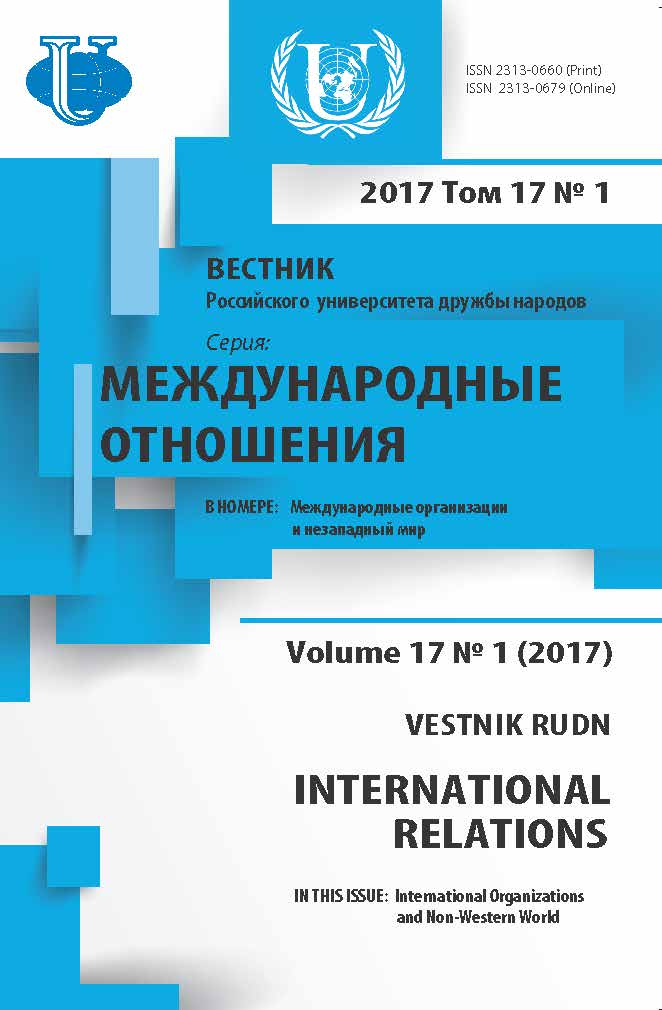The input of resolution A/RES/S-30/1 in the formation of the new global anti-drug approaches
- 作者: Eremin A.A.1, Eremina M.S.1, Abdurashitova E.A.1
-
隶属关系:
- Peoples’ Friendship University of Russia (RUDN University)
- 期: 卷 17, 编号 1 (2017): International organizations and Non-Western World
- 页面: 95-110
- 栏目: 世界和安全
- URL: https://journals.rudn.ru/international-relations/article/view/15880
- DOI: https://doi.org/10.22363/2313-0660-2017-17-1-95-110
- ID: 15880
如何引用文章
全文:
详细
The problem with proliferation of illicit narcotic and psychotropic substances has existed for as long as the humanity itself. However only relatively recently it has evolved into an international issue. It is hard to argue that the world drug problem cannot be solved only by the efforts of just one country. For these reasons international community has united their efforts in order to effectively deal with the problem of drugs that is not limited by certain country or region. One of the most important mechanisms of effort coordination against the drug traffic on the international level is the United Nations. The modern developments in the sphere of finding proper ways of combating illicit drug trade have shown that the international community tends to believe that drugs do not only damage the health of users, but provide a wide variety of social, economic and security risks. Keeping that in mind, the importance of the recently adopted resolution of the UN General Assembly on the issue of drugs is obvious and demonstrates high interest of the World in forming a balanced and effective way to fight the illicit drug trade. Most recent United Nations resolution A/RES/S-30/1 thus poses an immediate scientific interest in terms of researching the potential of the global anti-drug efforts. The article also critically assesses the current approaches towards combating illicit drugs, among which are the traditional coercive approaches of the War on Drugs and various “zero tolerance” policies.
作者简介
Arkadii Eremin
Peoples’ Friendship University of Russia (RUDN University)
编辑信件的主要联系方式.
Email: 79151775018@yandex.ru
Moscow, Russia
Mariya Eremina
Peoples’ Friendship University of Russia (RUDN University)
Email: mariya.eremina1@ru.neste.com
Moscow, Russia
El'nura Abdurashitova
Peoples’ Friendship University of Russia (RUDN University)
Email: elnura.sv@mail.ru
Moscow, Russia
参考
- Cardesa-Salzmann, A. (2016). Transnational Environmental Crime and the Resilience of International Law: Shaping Illegality in Multilateral Environmental Agreements. In: Joint International En¬vironmental Law. International Legal Theory Interest Group Meeting: The Resilience of Law, European Society of International Law. Riga.
- Latest, F., & Fryklund, I. (2012). On Drugs and Democracy. Foreign Policy in Focus.
- Matlin, S. A., Told, M., & Tinasti, N. (2014). Time to Revisit Drug Policies: Towards the UNGA Special Session on Drugs. Graduate Institute of International and Development Studies, Geneva.
- McCollum, B. (2002). Threat Posed by the Convergence of Organized Crime, Drug Trafficking, and Terrorism. Darby: Diane publishing.
- Potemkina, O. Yu. (2009). Narcotraffic — international security threat. In: Russia and Europe: non-military aspects of security. Russian academy of science. P. 170—198. (In Russ.).
- Ritter, A. (2009). Methods for comparing drug policies — The utility of composite Drug Harm Indexes. The International Journal on Drug Policy, 20 (6), 475—479.
- Rhodes, T. (2002). “The risk environment”: a framework for understanding and reducing drug-related harm. The International Journal of Drug Policy, 2 (13), 85—94.
- Rhodes, T. (2009). Risk environments and drug harms: A social science for harm reduction approach. The International Journal of Drug Policy, 20 (3), 193—201.
- Ruiz, A. R., Correa, L. H., Leon, D. O., & Williams, S. (2016). Coca Cultivation and Crop Eradication in Colombia: the Challenges of Integrating Rural Reality into Effective Anti-drug Policy. The International Journal of Drug Policy, 33, 56—65.
- Sandvik, K. B., & Hoelscher, K. (2016). The Reframing of the War on Drugs as a “Humanitarian Crisis”: Costs, Benefits, and Consequences. Latin American Perspectives, 20 (30), 1—15.
- Saenz, E., Busse, A., Tomas, J., & Clark, N. (2015). Major International Challenges in Addiction Treatment: The Experience of TreatNet and Beyond. In: el-Guebaly N., Carrà, G., Galanter M. editors. Textbook of Addiction Treatment: International Perspectives. Springer. p. 2459—2471.
- Serova, E. S. (2016). Conflictological aspects of correlation between extremism and drugs. In: Con¬flictologу, 2. p. 293—298. (In Russ.).
- Stepanova, E. S. (2016). Transnational threats: terrorism, drug traffic, piracy. In: Russia in the polycentric world. IMEMO. p. 141—148.
- Unlu, A., & Kapti, A. (2012). Failed alternative development programs: An implementation analysis of coca supply-reduction programs in Bolivia. International Journal of Public Policy, 8 (1, 2, 3), 160—179.
- Umpierrez, E., Chung, H., Iversen, L., & Ifeagwu, S. (2016). Terminology and Information on Drugs. United Nations Publication.
补充文件








